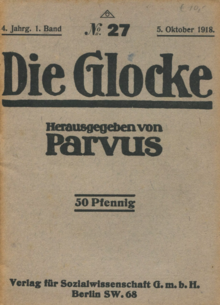The bell (magazine)
| The bell | |
|---|---|
| description | Weekly for politics a. Economy, art and Culture |
| publishing company | Berlin: Verlag für Sozialwissenschaft, 1915–1925, Munich, 1915–1916 (Germany) |
| First edition | 1915 |
| attitude | 1925 |
| Frequency of publication | weekly |
| Editor-in-chief | Alexander Parvus (Alexander Helphand) |
| ZDB | 534131-0 |
The bell was a "socialist weekly " for politics, finance, economy and culture, later a weekly for politics and economy, art and culture. It was originally published in Munich by the Munich publishing house for social sciences. The journal was later published in Berlin by Verlag für Sozialwissenschaften. It was published by the aforementioned publisher from the year 1.1915 / 16 to 11.1925. The editor of the paper was Alexander Parvus . The magazine “Die Glocke” was an organ of right-wing social democrats and was initially published as a bi-monthly publication, in 1917 the first issue was changed to weekly.
The editors were Karl Blasenbrei , Konrad Haenisch , Heinrich Cunow , Wilhelm Jansson , Paul Lensch , August Winnig , Max Beer , Ernst Heilmann , Robert Grötzsch , Erich Kuttner and Arno Scholz .
From 1915 the Lensch-Cunow-Haenisch group was formed within the SPD and tried to justify the position of the party majority on the issue of war credits in a Marxist way. They developed the theory of " war socialism " and published it in the Hamburger Echo and other SPD party papers. From mid-1915, Die Glocke , a magazine founded by Alexander Parvus, became the organ of the group.
In the magazine project “Die Glocke”, Parvus and Paul Lensch, former representatives of the left in social democracy, gathered. With the beginning of the First World War, both converted to the social-chauvinist, patriarchal-defending party wing. Lensch managed the feat of mutating from an opponent of the approval of war credits to an exponent of so-called war socialism within a few months. In 1922 he was expelled from the SPD after his engagement for the reactionary industrialist Hugo Stinnes . Parvus was also connected to Stinnes and acquired during the war a. a. an impressive fortune from arms-pushing. With this money Parvus financed, among other things, the bell.
With the 11th year and the 31st issue of October 31, 1925 and under its last editor in charge, Arno Scholz, Parvus discontinued Die Glocke .
Important authors of the magazine were Otto Flake , Johann Plenge , Hedwig Wachenheim , Ernst Reuter , Rudolf Breitscheid , Walter Gropius , Eduard Bernstein , Maxim Gorki , Theodor Heuss , Erich Ollenhauer , Ernst Preczang , Walther Rathenau , Bruno Schönlank , Philipp Scheidemann , Julius Zerfaß and many others .
literature
- Marcus Llanque: Democratic Thinking in War: The German Debate in the First World War. Akademie-Verlag, Berlin 2000, ISBN 3-05-003517-X , page 53ff.
- Max Hildebert Boehm: Radical order thinking from the First World War to the Federal Republic. Wallstein-Verlag, Göttingen 2013, ISBN 978-3-8353-1304-0 , page 106 ff.
- Stefan Vogt: National Socialism and Social Democracy: The Social Democratic Young Right 1918–1945. Dietz, Bonn 2006, ISBN 978-3-8012-4161-2 , pages 39-40.
- Aiga Seywald: The Press of Social Movements: 1918–1933. Klartext Verlag, Essen 1994, ISBN 3-88474-169-1 , page 139.
- Wilmont Haacke, Günter Pötter: The political magazine. Koehler, Stuttgart 1982, ISBN 3-87425-022-9 , page 340.
- Walther Georg Oschilewski: Words of thanks and remembrance: Spoken on the occasion. d. Hour of mourning f. Arno Scholz on Aug. 9, 1971 in the Berlin-Wilmersdorf crematorium. Graph. Ges. Grunewald GmbH, Berlin 1972, pages 15 and 19. DNB 720250064
Individual evidence
- ^ German literary journals 1880–1945: Ein Repertorium. The bell page 499.
- ↑ See Alexander Parvus .
- ↑ More Richard Lewinsohn : "The Stinnes Case" in: Die Weltbühne 21 (1925) No. 24, pages 899-902.
Web links
- The bell related article, Uni Jena.
